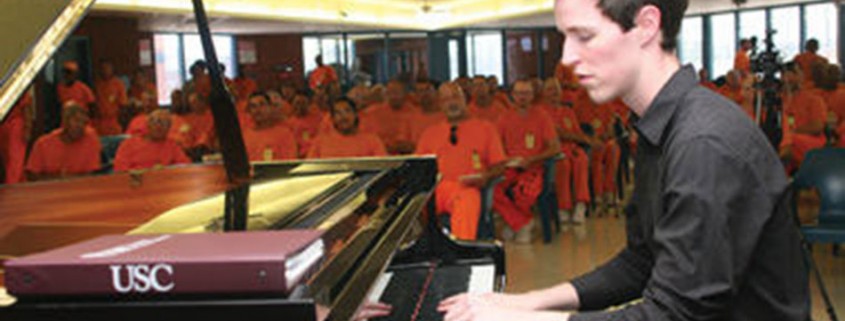Thornton student performs for prisoners
As senior music major Evan Pensis took his seat at the front of the room, 140 inmates shuffled in, finding their seats in metal folding chairs. The crowd was quiet — one man later told Pensis that each of the inmates was on their “best behavior,” afraid that inappropriate behavior from even one inmate would “make the music go away.”
But this silence was polite, dubious. Pensis could tell that the inmates were unsure what to expect from his concert. Their demeanor changed in minutes when Pensis began to play his first piece, a sonata by Soler. They were entranced, scooting forward to rest their elbows on their knees and listen.
“No one fell asleep,” Pensis said with a laugh. “They were, in all honesty, more attentive than most audiences I’ve had in great symphony halls. They listened, they cared, they asked incredible questions, and mostly, they felt the music, exactly as any performer wants their audience to feel it.”
After months of planning, Pensis performed two concerts on Sept. 4 for the inmates at the Arizona State Prison in Florence, Arizona. The concerts were the first in what Pensis hopes to be a series of concerts throughout prisons in Arizona next summer, aimed at providing classical music to a community that is almost completely detached from the fine arts.
Pensis purposefully structured his 90-minute concert to contain pieces that would appeal to a varied audience. He began with three sonatas from three different time periods to ease the inmates in while giving them an accessible illustration of how sonatas and music changed over three centuries. Then, Pensis performed six selections of etudes by Chopin and finished with Danse Macabre by Saint-Saens, a recognizable Halloween song.
“There is this perception that this isn’t going to be something that the inmates can enjoy,” Deputy Warden Sandra Walker said. “But what Evan was playing was beautiful, and I think anyone can connect to that beauty, whoever they are or wherever they’re from. It’s universal.”
Between the pieces, Pensis spoke to the inmates about the technique and history behind his next selection. Each piece in the concert had a specific purpose, and he found it important to explain this purpose to the inmates to enhance their experience.
The most powerful piece came in the very middle of the concert — a sonata by Prokofiev dedicated to the suicide of a dear friend. Pensis believed that the swelling emotion of the piece would connect deeply with the inmates. When he lifted his hands from the keys at the end of the sonata, he was met with stunned silence.
“They were awestruck,” Walker said. “It was such a deeply moving piece. The men in that room, they had been through a lot, more than [Pensis] can probably understand in some ways. But, his music, it connected everyone in a way that you couldn’t ignore.”
When the concert ended, Pensis stayed for another half hour to answer questions. Several inmates approached him, extending their programs for an autograph. One man said he wanted the program signed for Kaitlyn, his daughter.
“It’s so easy to forget that these are people with families and little kids outside of this prison,” Pensis said. “I think the way the prison system works, it’s easy to dehumanize these people and to forget that they are more than just their crime.”
In the weeks that followed his concert, Pensis received several letters from inmates who were touched by the experience. The letters were different from what he expected from inmates — intelligent, passionate and heartfelt.
“As a ‘sidelined’ branch of society, we inmates can’t help but feel dismissed by the world at large,” one inmate wrote in a letter. “When someone of your earnestness, humility and desire to share steps into our world and so effectively explains some of the intricacies of his performed art. We are stunningly blessed.”
The letters, Pensis said, are why he is determined to embark on another prison concert tour next summer. He only received positive reactions from the inmates. The words of one man have particularly stuck with Pensis — he said that in 20 years of living in the prison, the concert was the first time he forgot where he was.
“I believe that music, for some people, is about more than just performing and perfecting a craft,” Pensis said. “It’s about connecting [and] communicating. There’s something that can be communicated through music that words on their own simply can’t achieve. That’s what is beautiful about this series — it’s connecting and communicating in a way that’s never been done before. I couldn’t be more proud of it.”


What an inspirational story this is. We need more positive stories like this to offset all the negativity in the news. Thank you!